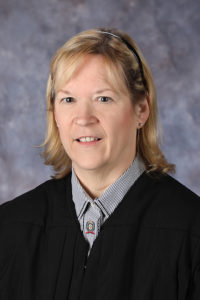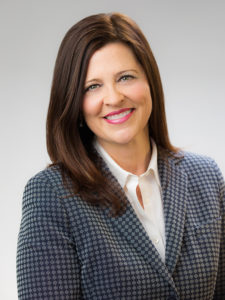Judge, First Family Court Circuit of West Virginia

By Katlin Swisher. Joyce Dumbaugh Chernenko was born and raised in Weirton, WV, at a time when the Northern Panhandle’s steel mills provided a good life for residents. Her hometown was a melting pot of backgrounds, with immigrants in search of the American dream from places as far away as the Czech Republic, France, Germany, Greece, Poland and the Ukraine.
“It was a phenomenal place to grow up,” says Chernenko, a judge for the First Family Court Circuit of West Virginia. “I will always cherish the opportunities it gave to me to understand people who are different than I am and to treat everyone equally and fairly. I think I am now a person who looks upon all persons equally because I was raised that way in my hometown.”
When it came time to choose a college, Chernenko opted to stay close to the hometown that had taught her so much. She earned a bachelor’s degree in communications from Bethany College in 1978.
“My undergraduate experience at Bethany College molded my life philosophy,” says Chernenko. “Bethany taught me that everyone’s goal, in order to achieve a fulfilled life, must include service to community and the greater world. In my senior year, that life philosophy led me to seek a career in law.”
Chernenko’s childhood experience in Weirton coupled with her service philosophy became the foundation for her worldview, which includes the fair treatment of all individuals, especially children.
After graduating from the West Virginia University (WVU) College of Law and practicing domestic relations law for 14 years, Chernenko was appointed to the bench by Governor Gaston Caperton in 1996, then elected in 2002, and has been serving in family court on behalf of the citizens of the First Judicial Circuit of West Virginia for 20 years. In this role, she presides over legal proceedings regarding children and families, including divorce, parenting, paternity, guardianship and child support, as well as civil domestic violence cases.
“I knew I could make a greater difference in the lives of children by making sound decisions that would help families get through the difficult issues they were facing and, most importantly, create stability for the children caught in the middle,” she says.
Chernenko has been on the forefront of family court judicial administration ever since.
In family court proceedings, children are often not just the victims in the cases but the unintended victims of the negativity and stress that come from being caught in the middle of circumstance. To help children overcome those experiences and protect their innocence, she has personally invested in creating children’s rooms adjacent to her courtrooms in Ohio and Hancock counties as safe spaces so children don’t have to witness their parents’ hearings.
The first children’s room was created in Ohio County. To help make the space more inviting for children, she enlisted the talents of students from her alma mater, Bethany College, to decorate the space, including a brightly colored mural depicting a sky showering down puppies and kittens.
“I see the children much more open and comfortable with the process,” she says of having the children’s rooms. “Even when I do not have to interview a child, parents will often bring the children to the court facility when they have a court hearing, even though we advise them not to. The children’s room can be used to keep the children out of the general waiting area where both of the parents are sitting and where tensions often run high.”
While the Ohio County children’s room was supported by a $2,500 grant, Chernenko and her husband, Marc, independently funded a similar project in her Hancock County family court facility.
“Ever since 2005 I had wanted to create a similar space in the Hancock County facility,” she says. “We have been given much, and we are expected to give back in return. It is just that simple.”
The children’s rooms also provide a comfortable, flexible space for Chernenko to interview children and capture their testimonies. “The fear and stress these children feel is tremendous, but the playroom setting of the children’s room makes all the difference,” she says. “I pop Daniel Striped Tiger into the DVD player, and we watch together while we chat. They become relaxed, and while what I hear from them is testimony, they think of it as playtime with Judge Joyce.”
As part of her continued work with families and children, she followed the example of a WVU College of Law classmate serving as an Eastern Panhandle family court judge to implement a family court parenting mediation program in her circuit two years before this kind of program was mandated statewide by the West Virginia Legislature. Because most of the custody cases in the pilot program were being resolved by parental agreements through the assistance of a Supreme Court-trained mediator, she saw its potential benefits for the First Circuit.
The real benefit, however, was not to the court system in general but rather to the parents and children. “After having had mediation in place for nearly 15 years, I see that 75 percent of my custody cases, even the most contentious, never go to trial because they are resolved by an agreement between the parents through mediation,” she says. “They are invested in an agreed parenting plan, and they rarely return to court with disputes after the plan is implemented by court order.”
Chernenko also adopted a parent education program in her circuit prior to the West Virginia Legislature implementing the same kind of program statewide.
“The parent education program does not teach parents how to parent. Rather, it opens parents’ eyes to all of the negative actions they take when they are going through a contested custody case—negative things that emotionally harm their children and actions that are designed to hurt the other parent through using the children,” says Chernenko. “The class shows them just how harmful these actions are to their children, with hopes of minimizing the negativity and bad acts. I have seen wonderful results with the program and heard parents cite the instructor’s teachings when they come to court, showing that they are clearly remembering his lessons.
Chernenko considers her greatest success to be the children and domestic violence victims she has helped throughout her career.
“Recently an attorney practicing in another state approached me and reminded me that I had presided over her parents’ contested custody case when she was a teenager,” she says. “She told me that the way in which I dealt with her in her parents’ case was one of the reasons she decided to become an assistant prosecutor who handles abuse and neglect cases. That is a true success.”
Chernenko also strives to set an example for the future of the state’s legal system by regularly mentoring Bethany College pre-law students during internships in her court. Since 1996, she has also advised the women of Bethany’s chapter of Zeta Tau Alpha, of which she is a member.
“I believe it is important to provide a strong female role model for college women—indeed all young women—today, particularly in the field of law,” says Cher-nenko. “We who are in the judiciary have a duty to set an example for young women of coming generations. They have a great need to witness successful women giving back to others. I know the Bethany women I work with are watching what I do and following my example. I hear it in how they speak about their future, their career goals and their life goals. Moreover, if I hear them talk about giving back, then I know I just might have made a small impact on a generation going forward.”









